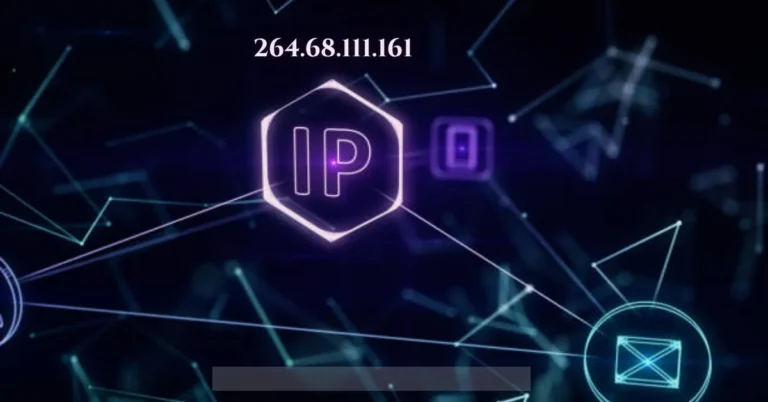Introduction to 264.68.111.161
Have you ever wondered about the mysterious numbers that make up an IP address? One such intriguing combination is 264.68.111.161. While it might seem like a random string of digits, this specific IP holds significance in the vast world of networking and cybersecurity. Understanding what an IP address is, why it’s essential, and how it functions can help demystify your online experiences.
Whether you’re browsing, streaming videos, or shopping online, every action you take on the internet involves an IP address behind the scenes—like a digital home address guiding data to its destination. Join us as we explore the purpose of 264.68.111.161 and gain valuable insights into protocols and security measures associated with IP addresses!
There’s so much more to discover—browse our related posts!
What is the 264.68.111.161 IP Address?
The IP address 264.68.111.161 is a unique identifier assigned to devices connected to the internet. It serves as an essential means of communication between computers and networks.
This specific address falls under the category of IPv4, which consists of four numerical sections separated by periods. Each section can range from 0 to 255.
However, it’s worth noting that this particular IP appears invalid within standard conventions since numbers cannot exceed 255 in any segment for proper functionality.
An IP address like this could be used for various purposes, including networking and device identification within local or wider networks, although practical applications are limited due to its irregular format.
Understanding how such addresses work is key in navigating online spaces effectively while ensuring secure connections at all times.
Understanding the Purpose of IP Addresses
IP addresses serve as unique identifiers for devices connected to a network. They enable communication between computers, servers, and other internet-enabled gadgets. Without them, the digital world would be chaotic.
Each IP address consists of numbers that pinpoint specific locations on the web. This functionality allows data packets to travel efficiently from one device to another.
Imagine sending a letter without an address; it would never reach its destination. Similarly, IP addresses ensure that information finds its way through the vast landscape of the internet.
They come in two main types: IPv4 and IPv6. While IPv4 is more widely used, IPv6 was developed to accommodate the growing number of devices online.
Understanding these nuances helps users navigate their digital environment with greater awareness and efficacy while ensuring smoother interactions across platforms.
The journey doesn’t stop here—explore more insights on our blog!
The Role of Protocols in IP Addresses
Protocols serve as the backbone of IP addresses, ensuring seamless communication across networks. They define rules and standards for data transmission, enabling devices to understand each other.
Every time you send or receive data online, protocols dictate how that information is packaged and addressed. Commonly used protocols include TCP (Transmission Control Protocol) and UDP (User Datagram Protocol). Each has its unique strengths depending on the nature of the data transfer.
TCP ensures reliability by establishing a connection before sending packets, making it ideal for applications like web browsing. Conversely, UDP prioritizes speed over reliability. It sends packets without waiting for confirmation, which suits real-time applications like gaming or video streaming.
Understanding these protocols can greatly enhance your grasp of network functionality. This knowledge empowers users to troubleshoot issues and optimize their internet experience effectively.
Security Measures for IP Addresses
Securing your IP address is essential in today’s digital landscape. Hackers often target IP addresses to gain unauthorized access, making robust security measures crucial.
One effective method is using a firewall. This acts as a barrier between your internal network and outside threats. It monitors incoming and outgoing traffic, helping to block suspicious activities.
Another layer of protection involves utilizing VPNs (Virtual Private Networks). A VPN encrypts your internet connection, masking your real IP address from prying eyes while you surf the web.
Regularly updating software can also mitigate risks. Outdated systems are more vulnerable to attacks, so ensure that both operating systems and applications are current.
Employing strong passwords for devices connected to the internet adds an additional safeguard against intrusions. Creating complex passwords that combine letters, numbers, and special characters makes it harder for cybercriminals to breach your defenses.
How to Protect Your IP Address from Cyber Attacks?
Protecting your IP address is crucial in today’s digital landscape. Start by using a virtual private network (VPN). This masks your real IP, making it challenging for attackers to trace you.
Keep your software updated. Regular updates patch vulnerabilities that hackers exploit. It’s an essential step in maintaining security on all devices connected to the internet.
Firewalls are another line of defense. They monitor incoming and outgoing traffic, blocking suspicious activity before it reaches your system.
Consider employing strong passwords for your network and devices to add extra layers of security against unauthorized access.
Be cautious with public Wi-Fi networks. If you must use them, ensure you’re connected through a VPN first to protect sensitive information from potential threats lurking nearby.
Conclusion: The Importance of Understanding Your IP Address
Understanding your IP address, such as 264.68.111.161, is essential in today’s digital landscape. It serves as a unique identifier for your device on the internet, playing a critical role in how data is transmitted and received.
The significance of knowing your IP address cannot be overstated. It impacts everything from online security to network performance and connectivity issues. By grasping the nuances of IP addresses, individuals can better navigate their online environments.
Moreover, being aware of potential threats linked to your IP address empowers you to take proactive measures against cyber attacks and breaches of privacy. Understanding protocols associated with it enhances our ability to troubleshoot network problems effectively.
Knowledge about your IP address fosters a safer and more efficient online experience while helping users maintain control over their digital footprints in an ever-evolving tech world.
Having more content? Dive into our latest posts now!

